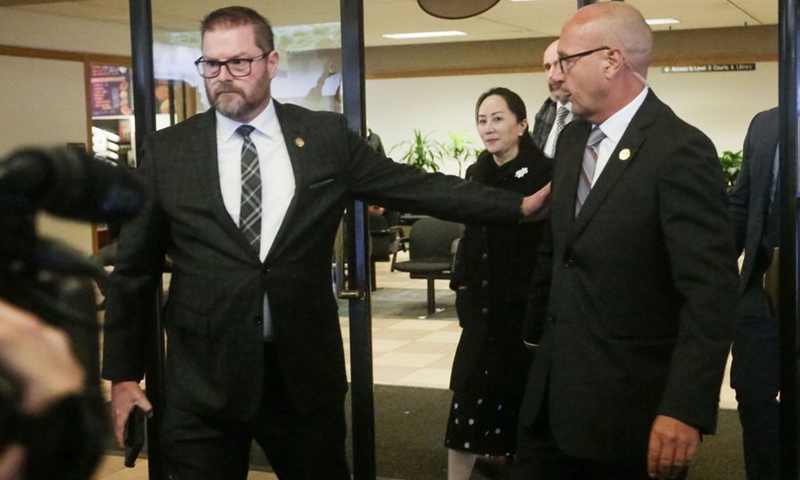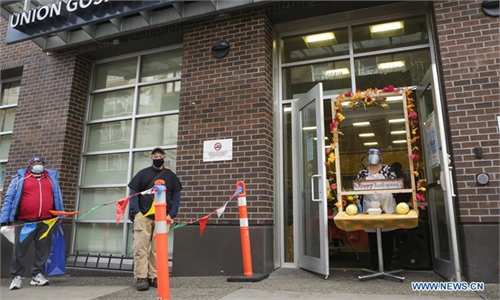
China's Huawei Chief Financial Officer Meng Wanzhou is seen at the Supreme Court of British Columbia in Vancouver, Canada, January 20. Photo: Xinhua
The longer Huawei CFO Meng Wanzhou is detained in Canada, the more damage it will do to China-Canada ties, and Canada would "eat the bitter fruit" of soured bilateral ties in many fields including trade, Chinese experts warned, as the 50th anniversary of bilateral diplomatic ties falls on Tuesday.
On October 13, 1970, China and Canada established diplomatic ties. In the past 50 years, China-Canada ties have undergone a positive momentum, which fits the interests and expectations of people from the two countries, Yao Peng, deputy secretary-general of the Canadian Studies Center of the Chinese Academy of Social Sciences, told the Global Times.
However, after Meng's arrest in 2018, ties were severely hurt. On issues on the South China Sea, China-Canada free trade talks, and US attacks on China's high-tech companies, Canada chose to follow the US or make ambiguous statements, which also affected bilateral ties, Yao said.
Meng was detained in Vancouver in December 2018 as Canada heeded US request.
The result of Canada's handling of Meng's case would determine future China-Canada ties. Canada should adhere to the independent diplomatic principle to get rid of US influence and make the right decision to release Meng, Yao said.
"Canada has long been submissive to the US, which should not be at the expense of hurting a third country's interests. Arresting Meng to cooperate with the US on suppressing China's high-tech enterprises is unacceptable," Lü Xiang, a research fellow at the Chinese Academy of Social Sciences in Beijing, told the Global Times.
Lü said Meng's case is of a high political nature, and was concocted by the US. "Meng has never done anything that hurts Canada's interests, but the two Canadians who were arrested in China undermined China's national security. The two incidents have nothing in common, and should not be put together."
Canada's arrest of Meng has destroyed the environment for the two countries to have more exchanges, he noted.
In June, two Canadian nationals, former diplomat Michael John Kovrig, and his intelligence contact Michael Peter Todd Spavor, were prosecuted by the procuratorates in Beijing and Dandong, Northeast China's Liaoning Province, for spying on China and collecting classified intelligence.
Lü said Canada should and must find a way to solve the current plight of bilateral ties, and the longer Meng is detained in Canada, the greater the harm to bilateral ties. "It is Canada that would eat all the bitter fruits of strained ties."
Canadian media reported that a judge in Canada has upheld the majority of Canada's privilege claims over documents sought by lawyers for Meng.
Chinese Foreign Ministry spokesperson Zhao Lijian told a press conference on Monday that Canada claimed it insisted on the so-called "rule by law" principle, but refused to disclose more details to the public. "Do they have secrets that cannot be told? It should agree to disclose the key information on Meng's case to let more Canadians know about the case."
Some Chinese diplomats, including Chinese State Councilor and Foreign Minister Wang Yi, made public remarks on China-Canada ties, urging Canada to take concrete moves to remove the main obstacle for ties.
Cong Peiwu, Chinese Ambassador to Canada, also said in an article in the Canada China Business Council on October 10 that "current China-Canada relations are in a rather difficult period, for a reason known to all… We hope that Canada can make the right decision independently from the perspective of its own interests, and correct its mistakes."
Cong also noted that since the establishment of diplomatic relations, the two countries' economic and trade cooperation has achieved win-win results. By 2019, it reached $74 billion, a nearly 500-fold increase. Over the past 20 years, the ratio of Canada's goods exports to China to its total goods exports has gradually increased from 1 percent to about 4 percent.
Although under the influence of the COVID-19 pandemic, total exports and imports with China represented 6.9 percent of Canada's global merchandise trade so far this year. That's almost a full percentage point higher than the average in the previous three years, and it's the highest share on record, according to data released on October 6 by Statistics Canada.
The data shows that despite the lack of mutual trust and some Canadian politicians' harsh attitude toward China, bilateral trade is going strong. China and Canada have a promising future on trade, and once bilateral ties return to normal, business would thrive, Yao said.
Analysts also warned that without properly handling Meng's case, all forms of exchanges would be hurt.




